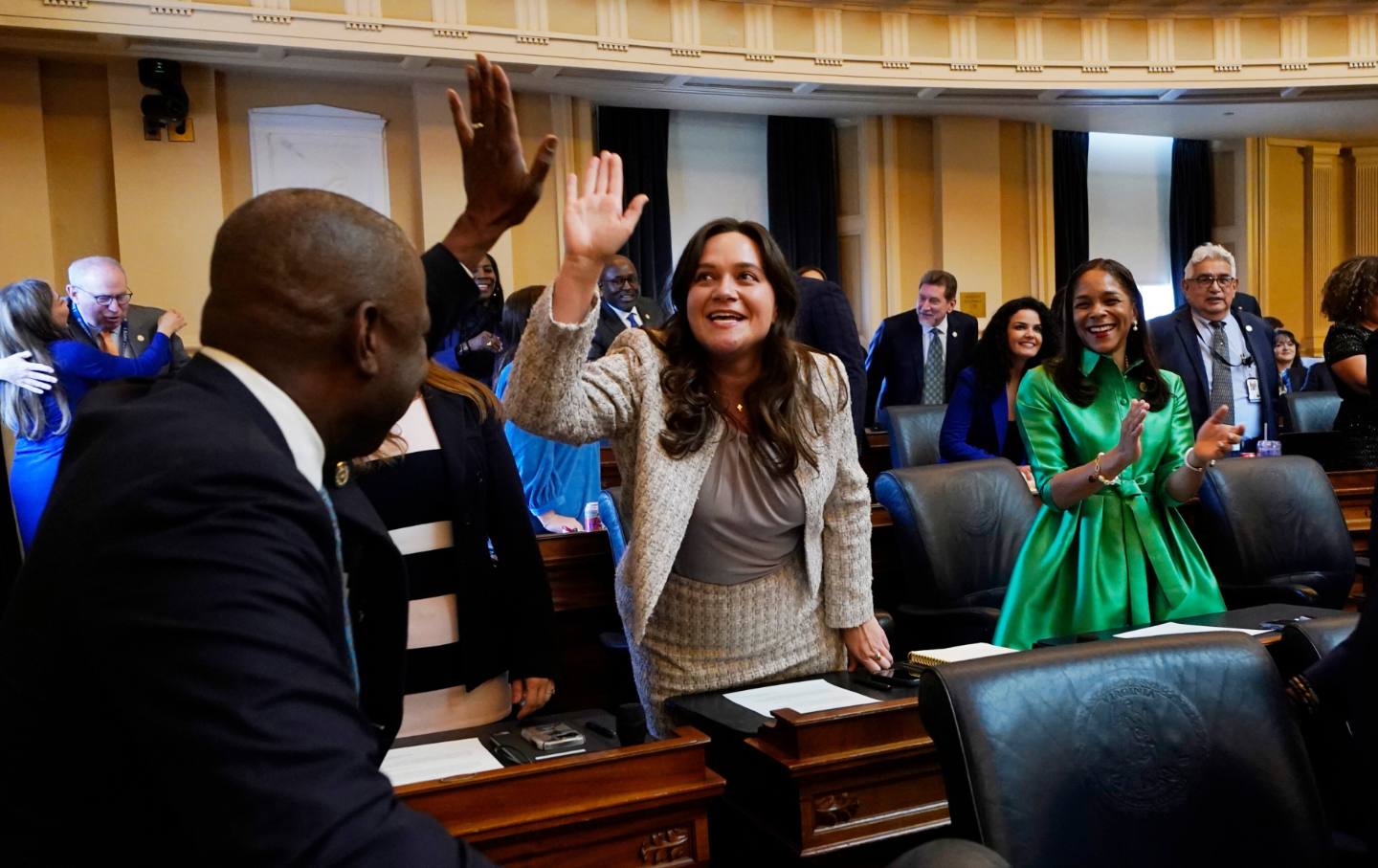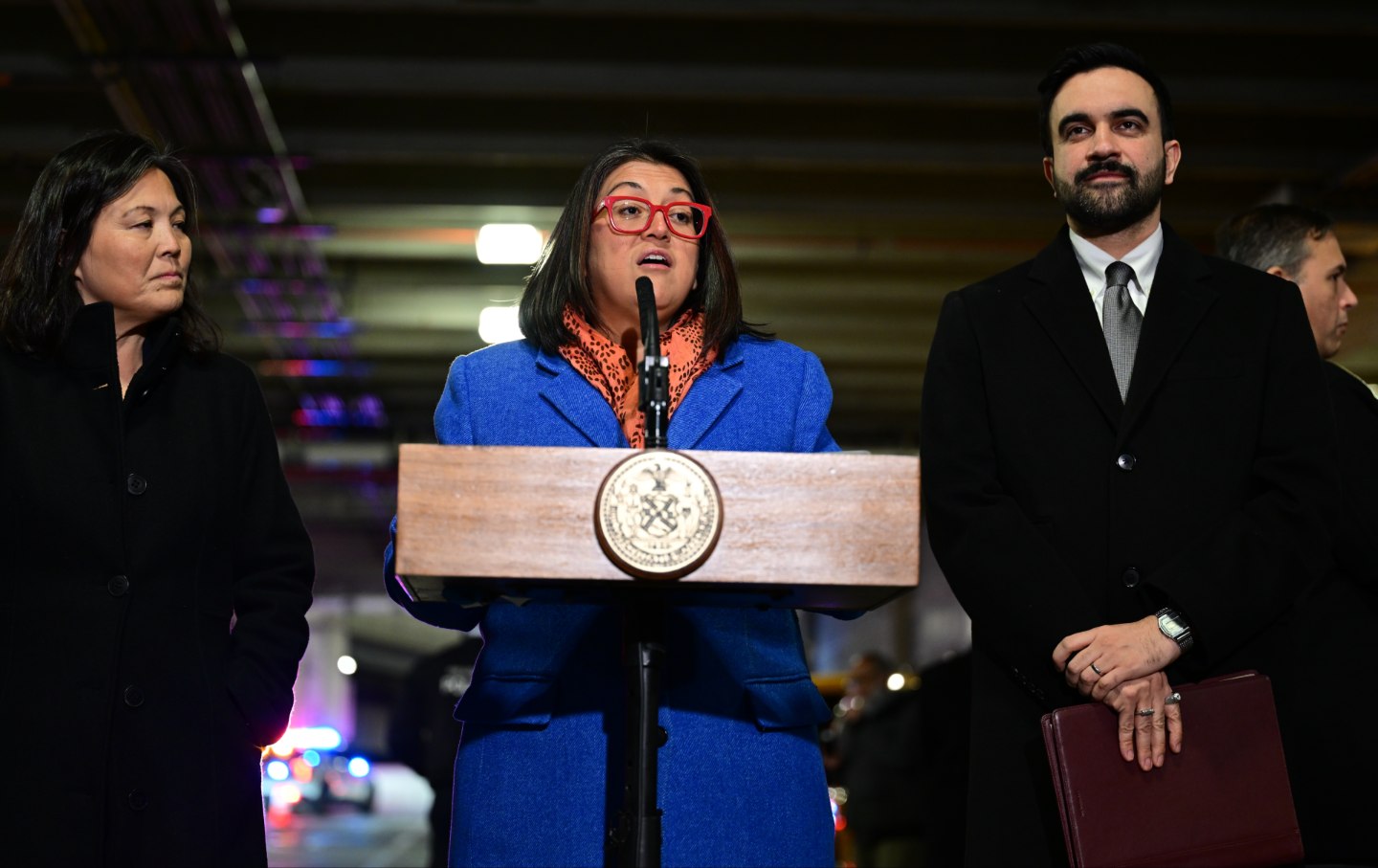If Democrats Want to Reconnect With the Working Class, They Need to Start Listening to Unions
The Democrats blew it with non-union workers in the 2024 election. Unions have a plan to get the party on message.

AFL-CIO president Elizabeth Shuler speaks during the 2024 Democratic National Convention at the United Center in Chicago on August 19, 2024.
(Bill Clark / CQ-Roll Call, Inc via Getty Images)
Democratic Party leaders acknowledge that they are struggling to figure out how to regain the trust, and the votes, of working-class Americans who no longer see their party as their political home. After the setbacks the party experienced in November, the candidates who are eyeing the chairmanship of the Democratic National Committee and other top DNC positions admit this is the party’s biggest challenge going forward. Ben Wikler, the head of the Democratic Party of Wisconsin and a contender for DNC chair, goes so far as to say, “The Democratic brand is broken, and is a drag to people in many parts of the country.”
Fair enough. So how do Democrats rebuild the brand so that it connects with working-class voters? How do they assemble the sort of multiracial, multicultural working-class coalition that, historically, delivered overwhelming majorities to Democratic presidential and congressional candidates from the days of Franklin Roosevelt and Harry Truman to those of Lyndon Johnson and Barack Obama?
There’s an easy answer to those questions: Get a lot more Americans into unions.
The labor movement gave overwhelming support to Vice President Kamala Harris and mounted an aggressive campaign to turn out their members for Democratic candidates up and down the ballot in 2024. Their efforts proved to be dramatically more successful than those of the Democratic Party. “Union members voted for Democratic endorsed candidates from the top of the ticket on down at a much higher rate than the general public,” explains AFL-CIO President Elizabeth Shuler.
Union members voted for Harris by a solid 57–39 margin, according to exit polls. That was comparable with the union vote for Joe Biden in 2020, a notable fact in an election year when support for Democrats declined among so many demographic groups. “In fact,” noted Politico, “union voters were one of the few groups that did not appreciably shift toward Trump and Republicans in what is shaping up to be one of the party’s strongest presidential election cycles in recent memory.”
So why are we hearing so much about the Democrats losing the working-class vote? Because most working Americans aren’t union members. As a result, they don’t get information about Trump’s aggressively anti-worker policies from the education campaigns that unions have developed to inform their own members and to turn those members out as voters for pro-labor candidates.
“Vice President Harris got a stronger percentage of union voters this election than President Biden did in 2020. But she still lost!” explains International Union of Painters and Allied Trades union president Jimmy Williams Jr. Why? “Because the Democratic Party has continued to fail to prioritize a strong, working-class message that addresses issues that really matter to workers,” explains Williams. “The party did not make a positive case for why workers should vote for them, only that they were not Donald Trump. That’s not good enough anymore!”
How could the party start to get it right?
The AFL-CIO has a plan.
Describing the race for DNC chair as a “unique opportunity to once again bring working people back to its center,” Shuler explains that the election of a new slate of DNC officers will allow the party to change its course and “center its purpose and messaging around the economic and social needs of working people.”
What resonated with union members in 2024 was a message “built around economic issues with broad appeal,” says Shuler. “In a time of heightened cynicism and distrust of politics, those messages were even more salient because they were delivered by voters’ trusted fellow union members at the door, in the workplace, on the phone, and through digital advertising. If there were more workers represented by unions, and as a result more voters, the outcome of the 2024 election would have been different.”
Shuler argues that “It’s time [for the Democrats] to stop doing business as usual. In order to win future elections, the party must refocus and be innovative in its approach to communicating with working people with a message that meets them where they are.”
That’s not just a call for change. That’s a new standard that can and should be applied when assessing the contenders for DNC posts.
Popular
“swipe left below to view more authors”Swipe →The unions that make up the AFL-CIO will, Shuler says, measure support for the coming DNC leaders by applying the following principles:
DNC leadership must have a strong connection to working people and unions. That means having extensively worked with—or even for—labor in the past. In addition to understanding working-class values, DNC leaders need to know how to organize and how to talk to working people. Having leaders who prioritize big-money corporate donors is flatly unacceptable.
The party must restore its connection to working people by focusing on the core economic issues they care most about. That means working closely with the labor movement to develop an economic framework of values-based policies and messaging that speaks to all working people, regardless of age, race, gender, or ideology. To be the party of working people, the Democrats need to talk openly and often with all working people about kitchen-table economic issues families think about daily.
Party leaders must commit to a robust, 365-day-a-year field program that engages workers in our communities. The only way Democrats can break through the political noise with a working-class agenda is to have a year-round infrastructure in place to reach voters where they are.
The party must address its failure to communicate successfully with working people and invest in innovative and creative methods of messaging instead of simply enriching the consulting class. Democrats must better utilize a variety of community-based platforms to reach working people wherever they are on the issues that matter most, not just near election time, but all the time.
As the race for DNC chair and other key positions progresses, Shuler says, “working people need to be at the table.” And they need answers to their most pressing concerns. “Every Democrat running for leadership should be able to clearly articulate an answer to this fundamental question: If you were elected as chair, what would you do to elevate labor and working people’s voices and influence within the Democratic Party?” Shuler and the unions of the AFL-CIO want specifics. And they should not be alone in demanding them.
Every Democrat who wants to reconnect their party with the great mass of working-class voters in this country should be demanding answers from the men and women who seek to lead the Democratic Party out of the wilderness.
Describing the race for DNC chair as a “unique opportunity to once again bring working people back to its center,” Shuler explains that, “As a diverse movement with organizing at its core, we know how to mobilize with a resonant message to win.”
What resonated with union members in 2024 was a a message “built around economic issues with broad appeal,” says Shuler. “In a time of heightened cynicism and distrust of politics, those messages were even more salient because they were delivered by voters’ trusted fellow union members at the door, in the workplace, on the phone, and through digital advertising. If there were more workers represented by unions, and as a result more voters, the outcome of the 2024 election would have been different.”
To create a politics where different, and better, results are possible for the Democrats, Shuler says party leaders must see the election of a new slate of DNC officers as “an opportunity to change the course of the Democratic Party and to center its purpose and messaging around the economic and social needs of working people. It’s time to stop doing business as usual. In order to win future elections, the party must refocus and be innovative in its approach to communicating with working people with a message that meets them where they are.”
That’s not just a call for change. That’s a new standard that can and should be applied to the contenders for top DNC posts.
The unions that make up the AFL-CIO will, says Shuler, “measure our support for the next slate of DNC leaders using the following principles:
DNC leadership must have a strong connection to working people and unions. That means having extensively worked with—or even for—labor in the past. In addition to understanding working-class values, DNC leaders need to know how to organize and how to talk to working people. Having leaders who prioritize big-money corporate donors is flatly unacceptable.
The party must restore its connection to working people by focusing on the core economic issues they care most about. That means working closely with the labor movement to develop an economic framework of values-based policies and messaging that speaks to ALL working people, regardless of age, race, gender, or ideology. To be the party of working people, Democrats need to talk openly and often with all working people about kitchen table economic issues families think about daily.
Party leaders must commit to a robust, 365-day-a-year field program that engages workers in our communities. The only way Democrats can break through the political noise with a working-class agenda is to have a year-round infrastructure in place to reach voters where they are.
The party must address its failure to communicate successfully with working peopleand invest in innovative and creative methods of messaginginstead of simply enriching the consulting class.Democrats must better utilize a variety of community-based platforms to reach working people wherever they are on the issues that matter most, not just near election time, but all the time.
As the race for DNC chair and other key positions progresses, Shuler says, “working people need to be at the table.” And they need answers. “Every Democrat running for leadership should be able to clearly articulate an answer to this fundamental question: If you were elected as chair, what would you do to elevate labor and working people’s voices and influence within the Democratic Party?” Shuler and the unions of the AFL-CIO want specifics. And they should not be alone in demanding them. Every Democrat who wants to reconnect their party with the great mass of working-class voters in this country should be demanding answers from the men and women who seek to lead the Democratic Party out of the wilderness.
More from The Nation

Democrats Really Can Compete in Rural America Democrats Really Can Compete in Rural America
The results for the 2025 election cycle send a powerful message regarding strategies that connect outside of urban centers.

Mamdani Starts Governing by Getting the Imagery Right Mamdani Starts Governing by Getting the Imagery Right
Early signs suggest that the Mamdani era in New York is off to an encouraging start—beginning with the mayor's continued mastery of political spectacle.

The Defiance Is Steadily Building, in Increasingly Unlikely Places The Defiance Is Steadily Building, in Increasingly Unlikely Places
It’s the protesters on the streets in Minneapolis fighting ICE, DOJ lawyers who’ve resigned over the investigation into Renee and Becca Good—and many more opposing Trump’s abuses....

Zohran Mamdani’s Taxi Agenda Pulls Up to City Hall Zohran Mamdani’s Taxi Agenda Pulls Up to City Hall
Mamdani names Midori Valdivia as taxi commissioner as the drivers who powered his rise press him to finish the fight against medallion debt.

ICE = KKK ICE = KKK
On January 7, an ICE agent shot and killed U.S. citizen Renee Nicole Good in Minneapolis—state violence rooted in racism, fear, and impunity, echoing America’s darkest histories.



